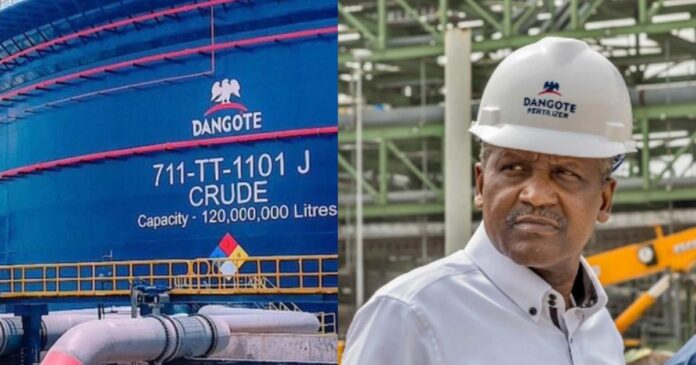By Tanimola Adedeji
Nigeria and its citizens are currently going through enormous pains as a result of the quest to emplace as close to a perfect market as can be in the downstream sector of the oil and gas industry. Over the years, a number of factors distorted the market, chief of which was the fuel subsidy regime. With the big elephant out of the room, the process of recalibrating the next big factors of supply and price is wreaking havoc on the system with players pitching their tents on various sides in a bitter game of recriminations. At the centre of this game is Africa’s richest man, Alhaji Aliko Dangote, and his multi-billion-dollar petroleum refinery.
Since earlier in the year when the Dangote Refinery began to source feedstock for the plant to commence operations, Dangote has managed to cut a somewhat curious image for himself, the image of Esau as painted at Genesis 16:12 in the Bible: “This son of yours will be a wild man, as untamed as a wild donkey! He will raise his fist against everyone, and everyone will be against him. Yes, he will live in open hostility against all his relatives.” (NLT).
Dangote has almost literally raised his fist against everyone in the industry. When he is not attacking the upstream regulator, the Nigerian Upstream Petroleum Regulatory Commission (NUPRC) for not helping to guarantee crude oil supply to his plant, he is up in arms against the downstream regulator, the Nigerian Midstream and Downstream Petroleum Regulatory Authority (NMDPRA) for granting licenses to marketers to import petroleum products. He is on record to have attacked the NNPC Ltd and the International Oil Companies for not selling crude oil to him. Lately he has shifted the battle to the marketers for not buying refined petroleum products from his refinery. He has dragged the NMDPRA and some marketers to court to stop them from importing petroleum products when his refinery has enough products in-country. He has accused the NMDPRA of lacking the capacity to certify the standard of products, which is quite unfortunate. We pray that the day does not come when the quality of his products will be called to question. If that day comes, it will be difficult to verify the standard of his own products since it will be difficult for the public to trust the regulator he has denigrated and he cannot be a judge in his own case!
In all these battles, Dangote comes across as someone who is not ready for a deregulated market. And this is quite baffling because one of the reasons cited by some of those who were granted licenses to build refineries but could not do so was that the regulated market regime made their projects unbankable as lenders raised questions about sustainability. A deregulated market ensures that both refiners and marketers sell at market-driven prices that guarantee a decent profit for business sustainability.
But as the market is in the process of reset into being a deregulated or perfect market, Dangote appears not to be comfortable with it. His tantrums manifesting in the form of battles with all other players in the industry are all geared towards manipulating the market reset process to create a market situation that suits and favours him. If not, what is the rationale behind his insistence that all marketers must willy-nilly buy from him? Is he willing to accept the direct opposite of his position which is that he must willy-nilly sell products to local marketers whether they can afford his price or not, and that he cannot export products until he satisfies the local market?
That Dangote has set his eyes on running a monopoly in the downstream sector for a long time is not in doubt. Way back in 2019/2020 when the Petroleum Industry Bill was being debated in the National Assembly and his refinery had not got to the point of commissioning, he wanted the lawmakers to insert a clause in the law banning importation of petroleum products. When that didn’t fly because of the implication on the overall national energy security, he insisted that the clause be rephrased to read that only refineries owners should be allowed to import petroleum products if there is a shortfall in local production. So, his fixation on having a downstream market that is skewed in his favour is really nothing new. The method of achieving that is what has changed from benign to malevolent.
The latest of his tactics is the spurious argument that Nigeria is the only oil producing country that keeps on importing petroleum products. This argument is not true as there are many oil producing countries that import products for a number of reasons. The reasons could range from refining capacity limitation to economic considerations and supply-demand mismatch. While not advocating a wholesale importation regime for Nigeria, and while it is good for us to develop local refining capacity, it is not economically wise to be stampeded into a decision of outright ban on importation, as Dangote wants Nigeria to do. That was the wisdom in the rejection of his proposals by the lawmakers in 2020. The lawmakers understood that any of a number of things could come up that could require that products be imported.
In fact, a country like Saudi Arabia with more that 10 times Nigeria’s production capacity sometimes resort to product importation. Others like Brazil, Indonesia, Mexico, Iran, Algeria, and Angola often import petroleum product despite their strong credentials in crude oil production. It is just like crude oil importation, many oil producing countries do import certain grades of crude oil to blend with theirs for refining in order to maximize the yield of certain products. The notion of self-sufficiency in matters of crude oil and refined products is actually very fluid and is better handled by regulatory agencies on the basis of as-the-need-arises and not on the basis of emotions.
It is understandable that as a business man, Dangote wants to make as much money from his huge investment in the refinery as possible. But such aspiration is better realized on a sustainable basis in a fully deregulated market that is as close to a perfect market as possible. The competition that is enabled by such a market creates enormous efficiencies and benefits for both the producers and consumers.
The market is on a reset mode. It is in the interest of everyone – refiners, marketers, retailers, and consumers – to allow the process to run to its logical conclusion where water would find its level. Throwing tantrums everyday like a spoilt child whose lollipop was taken away, accusing marketers of importing sub-standard products, and insisting that the regulator lacks capacity to certify the quality of products are wrong-headed strategies that could at best yield temporary results. Fortunately for the market and unfortunately for Dangote, majority of Nigerians see through the shenanigans and know exactly that he is fighting to establish a monopoly. However, the oil industry is a different kettle of fish altogether. Though the downstream may be local, it has international linkages that insulate it from such manipulations.
It is a good thing that other countries are beginning to explore the possibility of patronizing his refinery. He should concentrate on beefing up production to service his growing customer base rather than short-circuit the ongoing market reset process.
Tanimola Adedeji, an energy market analyst, wrote in from Lagos.

























